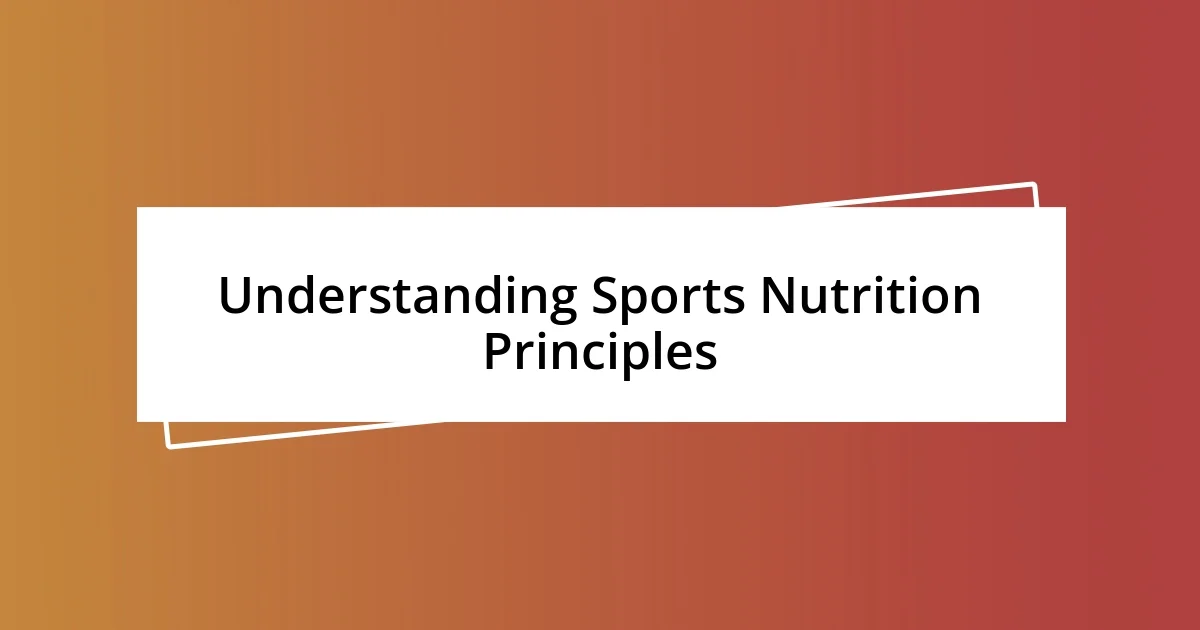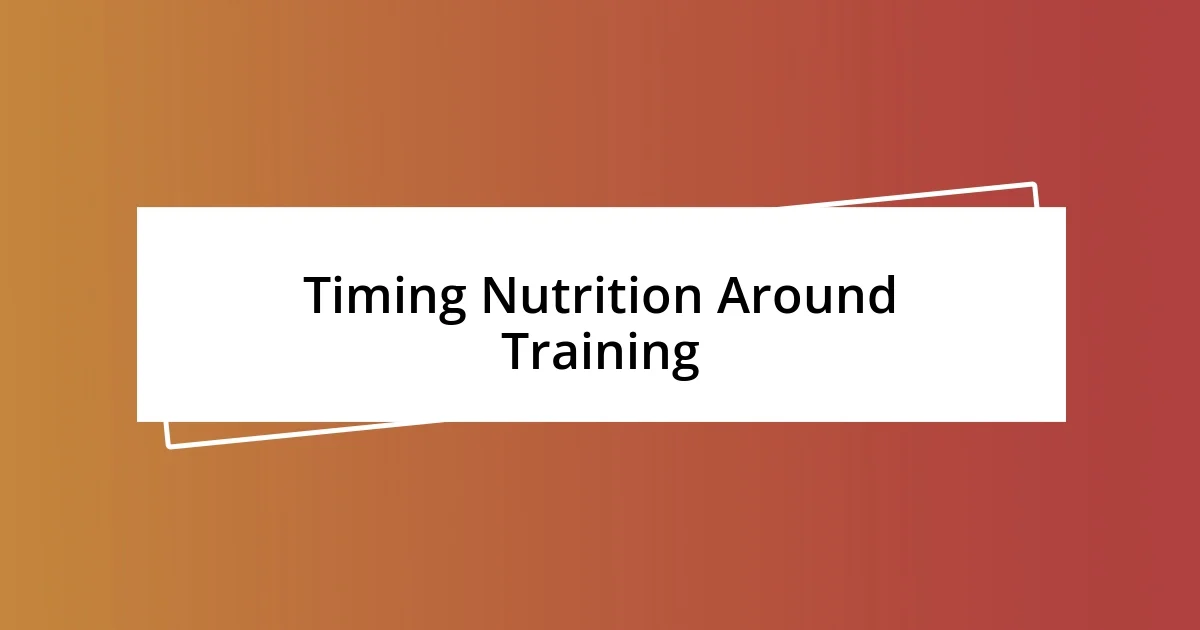Key takeaways:
- Timing is crucial in sports nutrition; proper pre- and post-workout meals can significantly impact performance and recovery.
- Individual nutritional needs vary among athletes; factors like metabolism, sport type, and personal preferences should guide dietary choices.
- Listening to your body, including cravings and hydration cues, is essential for optimizing nutrition and athletic performance.

Understanding Sports Nutrition Principles
Understanding the principles of sports nutrition goes far beyond just counting calories or believing in food myths. I’ve learned that it’s about fueling your body correctly to enhance performance and recovery. For instance, I remember a time when I neglected carbs before a long run; my body quickly reminded me how crucial they are for energy.
One of the most important aspects is timing. Consuming the right nutrients at strategic moments can make a world of difference. I often ask myself, “What would happen if I skip my post-workout protein shake?” Well, after one experience of waiting too long, I felt my fatigue linger much longer than usual. It reinforced how swiftly our bodies can react to our nutritional choices.
Also, hydration is sometimes overlooked, but it’s a key principle for anyone involved in sports. I used to think just water was enough, until a particularly hot game left me feeling dizzy and sluggish. That experience taught me the value of electrolytes, and now I prioritize them just as much as my meals. Are you paying attention to what your body tells you about hydration?

Identifying Nutritional Needs for Athletes
When it comes to identifying nutritional needs, it’s essential to recognize that each athlete is unique. I remember a fellow teammate who thrived on a high-fat, low-carb diet, while I felt best with balanced meals. This difference highlighted how individual metabolism and sport type significantly influence dietary requirements. I’ve grown to appreciate that athletes should assess their goals, training intensity, and overall health when determining their nutritional plans.
To help pinpoint your own nutritional needs, consider the following factors:
- Energy Requirements: Estimate your daily caloric intake based on activity levels.
- Macronutrient Balance: Determine the right ratio of carbohydrates, proteins, and fats for your specific sport.
- Personal Preferences: Take into account food sensitivities and flavor preferences.
- Hydration Needs: Monitor hydration levels based on weather and exertion.
- Supplementation: Evaluate if you need any vitamins or minerals to support performance.
Through my journey, I’ve learned that it’s not just about what you eat but also about how well you’re listening to your body. Adjustments might take time, but each tweak helps me feel more aligned with my performance goals.

Creating a Balanced Meal Plan
Creating a balanced meal plan can feel daunting, but I’ve found it’s all about striking the right balance of nutrients for my energy needs. I like to visualize my plate: half filled with fruits and vegetables, a quarter with lean proteins, and the remaining quarter with whole grains. This way, I ensure that I’m not just eating for fuel, but also enjoying a variety of flavors and textures. One time, I made the mistake of skipping the veggies and got a little too comfortable with just meat and potatoes; let’s just say my energy during workouts took a hit!
When planning meals, I also think about preparation. For me, meal prepping is a game changer. Knowing I have healthy options ready to go means I’m less likely to grab convenience snacks that lack nutrients. I remember one busy week, I slipped into relying on takeout, and I could tell; my focus during training sessions wasn’t sharp. Having meals prepped in advance can help navigate those hectic days, ensuring I have the right fuel when I need it most.
Lastly, I believe in making adjustments based on how my body feels. If I notice fatigue creeping in, I’ll reassess my meal choices for more complex carbohydrates and proteins. This willingness to adapt is vital. I’ve learned that flexibility in my meal plan lets me respond to my training demands and recovery needs. What works one week may need tweaking the next, and that’s perfectly okay—it’s all part of the process!
| Food Group | Purpose |
|---|---|
| Fruits & Vegetables | Provide vitamins, minerals, and antioxidants for overall health. |
| Lean Proteins | Support muscle repair and growth post-exercise. |
| Whole Grains | Offer sustained energy through complex carbohydrates. |

Incorporating Supplements Effectively
Incorporating supplements into my nutrition routine has required some careful thought and a bit of trial and error. For example, I once jumped on the protein powder bandwagon, convinced it would be my shortcut to muscle recovery. However, I realized that too much protein, especially from supplements, upset my stomach and left me feeling sluggish rather than energized. So, I shifted to using it more strategically on days when I truly needed that extra boost, rather than relying on it every day.
When it comes to choosing which supplements to include, I always prioritize quality over quantity. I vividly recall a time when I bought a well-known multivitamin that promised a wide array of benefits. To my surprise, it didn’t blend well with my existing dietary habits and left me feeling off. After that, I learned to do thorough research on reputable brands and consider what my body actually needs. I now consult with a nutritionist, which has been a game changer. Have you ever felt overwhelmed by so many options? I know I have! Finding the right supplements for me has involved asking myself what truly complements my diet and filling in the gaps, rather than just adding more to my routine.
Lastly, I’ve recognized the importance of timing when I incorporate supplements into my diet. For instance, I take an omega-3 supplement right after my morning workout to aid recovery. I once made the mistake of taking it at night, and I just didn’t feel its benefits as much. Understanding when to use specific supplements has helped me optimize my performance and recovery. What about you? Have you found that certain supplements work better at particular times? It’s been enlightening for me to see how these small changes can make a significant impact on my overall wellness and athletic performance.

Timing Nutrition Around Training
When it comes to timing my nutrition around training, I’ve found that the pre-workout meal is crucial. I typically enjoy a light meal about an hour before I exercise, focusing on easily digestible carbs and a touch of protein—think a banana with a spoonful of peanut butter. I vividly remember a day when I skipped this ritual, and halfway through my workout, I was left feeling drained and unfocused. The right timing of nutrients really fuels my performance and helps me push through those tough sets.
Post-training nutrition is just as vital for my recovery. I’ve learned the hard way that neglecting this can really set me back. After an intense session, I aim to eat a balanced meal rich in proteins and carbs within 30 to 60 minutes. There was one occasion when I finished a grueling race, and instead of refueling properly, I rushed home feeling shaky. By the time I ate, hours had passed, and my muscles felt sore for days! Now, I keep protein bars or shakes handy to ensure I replenish my energy right after a workout; it’s amazing how much of a difference it makes.
Another aspect I pay attention to is hydration. I’ve discovered that sipping on electrolytes before and during longer training sessions keeps me feeling light on my feet. I recall a hot summer run where I didn’t hydrate adequately—yikes! I felt lethargic and couldn’t reach my usual pace. I now actively remind myself to sip water throughout the day and increase my intake surrounding intense workouts. Trust me, your body will thank you for it!

Listening to Your Body Needs
Listening to my body is something I’ve grown to prioritize in sports nutrition. Have you ever finished a tough workout and just felt off? I recall a time I pushed through fatigue without really tuning in, only to find myself lacking energy for days. It taught me that paying attention to signs—like cravings or sudden drops in energy—can be a true guide to my nutritional needs.
I find that certain foods resonate better with me when I’m training hard. For instance, after a long run, I crave salty snacks, which initially puzzled me until I realized I was probably low on electrolytes. Now, I listen to that urge, incorporating foods like pretzels or lightly salted nuts into my post-workout snacks. It feels almost instinctual, like my body has its own language, and it’s reassuring to know I can trust those cues.
I’ve also learned that hydration isn’t just a numbers game, but rather a personal journey. There have been moments when I ignored my thirst and regretted it, feeling sluggish and irritable. After experimenting with different hydration strategies, I discovered that my body reacts better when I sip water frequently rather than gulping down a ton at once. Have you tried this approach? It’s fascinating how such a simple habit can have a profound impact on my performance and overall well-being.

Evaluating and Adjusting Your Approach
When it comes to evaluating and adjusting my approach to sports nutrition, I frequently take stock of what’s working and what’s not. I remember a time when I used to eat the same pre-workout meal daily, convinced it was perfect. But after several months, I noticed my energy was fluctuating during workouts. That’s when I started experimenting with different foods and timings, leading me to discover that sometimes a simple switch, like adding yogurt instead of peanut butter, made all the difference in my performance.
Tracking my nutrition also plays a critical role in this evaluation process. I often keep a food diary, noting how I feel during workouts post-meal. It’s fascinating how a pattern started to emerge. One week, I might’ve felt great after incorporating more whole foods like quinoa and vegetables, while the next, my performance dipped because I indulged too heavily in processed snacks. Have you ever analyzed your food intake and emotions after meals? It’s like a mini-revelation each time, enabling me to adjust my approach thoughtfully.
In addition, I engage in regular discussions with fellow athletes and nutritionists. These conversations frequently open my eyes to new techniques and ideas that I hadn’t considered before. For instance, a friend once shared how trying a high-fiber breakfast set her up for success throughout the day. Inspired, I decided to try it for myself, and I was pleasantly surprised by how sustained my energy felt during the morning training sessions! Suddenly, the small tweaks I made based on feedback transformed my perspective on nutrition. Do you find inspiration from others in your journey too? It’s a lovely reminder that nutrition isn’t just a science; it’s a shared experience with room for growth and adaptation.












